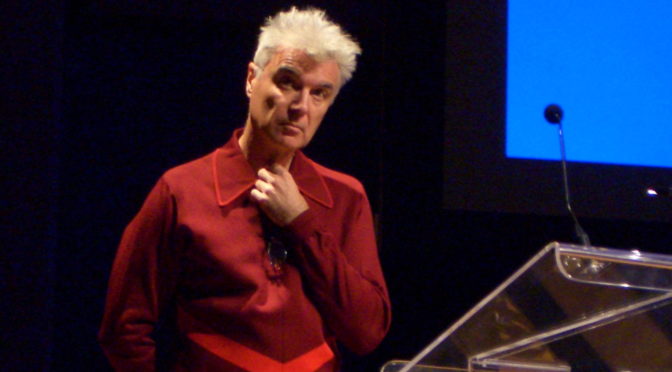Up till now the Service Employees International Union (SEIU) efforts to organize America’s fast food workers are blocked by the fact that most of them (including 700,000 McDonald’s workers) are employed by franchises. Therefore, the union cannot legally negotiate a contract with the corporation that owns the brand name. SEIU says their two strategies for working towards fast food worker organization are: try to get the National Labor Relations Board and courts to rule that fast food companies exercise so much control over their franchisees that they are effectively joint employers, and to use publicity to pressure fast food corporations to order franchisees to treat their workers better.
Tag Archives: union
Postal Workers’ Union Alleges Canada Post Union-Bustin
The Canadian Union of Postal Workers (CUPW) has alleged that Canada Post is union-busting, having dropped its contract with the unionized temp agency that had been staffing its parcel intake plants. When a unionized company is sold or transferred, union-busting is prevented by the labor code under “successor rights provisions,” which ensure that a collective agreement remains in tact and workers keep their jobs during the transition. But when a unionized subcontractor loses a contract, as with the aforementioned situation, these protections do not apply. So, the union is forced to weigh their options, which may include filing an unfair labour practice complaint with the Industrial Relations Board against Canada Post.

Top 10 Reasons to Record AFM
In summary, and with apologies to David Letterman, the EMSD staff have compiled the Top 10 most important reasons why you should record under AFM agreements:
10 Standard wages—You are guaranteed to receive at least the minimum standards for your services.
9 Doubling and overdubs—In addition to the wage payments, the employer is required to make payments for your doubling and overdub services.
8 Foreign use—If you perform services in the production of a show produced under most of the AFM’s television agreements, aside from the payment due to you for your original services, if the program is broadcast overseas, you will receive additional payments.
7 DVD payments—If the program is released into the DVD format, you will be entitled to additional payments that will continue to accrue based on the gross receipts.
6 Pension fund contribution—The employer is required to make a pension fund contribution on your behalf, which puts your session work into the system.
5 Health and welfare fund contribution—The employer is required to make a health and welfare contribution, either to the health plan of your local (if it has one), or directly to you.
4 Special payments fund—If you perform services on a session(s) for a sound recording, you are guaranteed to receive payments from the Sound Recording Special Payments Fund for the next five years.
3 Secondary markets fund—Under the Basic Theatrical Motion Picture or Television Film Labor Agreements you will qualify for distributions from the Film Musicians Secondary Markets Fund, should the film be released to outlets such as pay cable TV or the home video market.
2 Reuse—Under the Commercial Announcements Agreement you will receive periodic reuse payments for any new cycles the commercial(s) enter into.
And the number one reason to record AFM:
1 New use—If you perform services under an AFM agreement and your product is licensed for use in another medium, such as a theatrical motion picture, television film, or commercial announcement, you will be entitled to additional payments as if you had performed the work under that agreement.

David Byrne Talks Performance Rights
Local 802 (New York City) member David Byrne, who became a board member of SoundExchange in May, visited Capitol Hill last week to speak with Representative Jerrold Nadler about the Fair Play, Fair Pay Act of 2015, which would create a performance right for sound recordings used on terrestrial radio and mandate royalty payments to record labels. Nadler has been a strong advocate for issues dear to artists and music companies and is co-sponsor of the bill.

Members Object to Having Their Songs Politicized
When Neil Young of Local 47 (Los Angeles, CA) rejected Donald Trump’s use of his song for political purposes he was in good company. Rollingstone published a list of 34 artists who objected to the use of their tunes in political campaigns, among them were Bruce Springsteen of Local 399 (Asbury Park, NJ) and 47 regarding Ronald Regan’s use of “Born in the USA”; Dave Grohl of Local 47 over John McCain’s use of “My Hero”; Nancy Wilson of Local 76-493 (Seattle, WA) over Sarah Palin’s use of “Barracuda”; Eddie Van Halen over John McCain’s use of “Right Now”; John Mellencamp of Local 11-637 (Louisville, KY) over John McCain, George Bush, and Ronald Regan’s uses of “Our Country,” “Pink Houses,” “ROCK in the USA,” and “Pink Houses”; Joe Walsh of Local 4 (Cleveland, OH) over Congressman Joe Walsh’s use of “Walk Away”; Neil Peart of Local 298 (Niagara Region, ON) over Rand Paul’s use of “The Spirit of Radio” and “Tom Sawyer”; and David Byrne 802 (New York City) over Charlie Crist’s use of “Road to Nowhere.”
International Federation of Musicians: Lessons Learned from Musicians Unions from Around the World
Attending the executive committee meetings of the International Federation of Musicians (FIM) in Helsinki brought home the importance of having ongoing relations with the other musicians’ unions in the world. Too often we focus on problems that impact us directly and personally, which leads to isolated thinking, oblivious that others have or have had similar issues elsewhere.
SOCAN Music Awards
The AFM wishes to congratulate all of its members who were honored at the SOCAN Music Awards. Among those receiving SOCAN Awards were:
- Randy Bachman of Local 145 (Vancouver, BC), Lifetime Achievement Award
- Dallas Green of Local 298 (Niagara Region, ON), National Achievement Award
- Brett Kissel of Local 390 (Edmonton, AB), Country Music Award for “3-2-1”
- Tim Hicks of Local 298, Country Music Award for “Got a Feeling” (Roots 3 Music Inc.)
- Robert Carli of Local 149 (Toronto, ON), Domestic TV Music Award – Fiction, for Murdoch Mysteries
- Ian LeFeuvre, Ari Posner, and Chris Tiat, all members of Local 149, Domestic TV Music Award – Animated, for Johnny Test
- Jeff Danna of Local 47 (Los Angeles, CA), Achievement in Feature Film Music Award for The Expatriate
- Andrew Lockington of Local 149, Achievement in Feature Film Music Award for Percy Jackson: Sea of Monsters
- Keith Power of Local 47 (Los Angeles, CA), International TV Series Music Award for Hawaii Five-O
- The Strumbellas of Local 149, Folk/Roots Music Award
- Shawn Mendes of Local 149, 2015 SOCAN Breakout Award
- Kirk MacDonald, of Local 149, Hagood Hardy Award
Recording Musicians Associations Represents AFM’s Recording Musicians, a Year in Review
 by Marc Sazer, President Recording Musicians Association (RMA) and Member of Local 47 (Los Angeles, CA)
by Marc Sazer, President Recording Musicians Association (RMA) and Member of Local 47 (Los Angeles, CA)
Elayne Jones is a luminary musical pioneer. A premier timpanist, she broke down barriers throughout her stellar career: as first woman and first African-American to play timpani in major orchestras. She began with the New York City Opera in 1949, and her career extended to the San Francisco Symphony and San Francisco Opera. Today, in her 80s, Jones counts on her union pension for security in her retirement.
The recently ratified agreement between our union and the film and TV studios will now make Jones’ pension more secure. Recording musicians helped craft a proposal to contribute a portion of the residuals from the Film Musicians Secondary Markets Fund (FMSMF) to the AFM pension fund as a whole. Once the trustees have worked out procedures, this contribution will not be earmarked for individual benefits. Instead, the new money will help secure the fund for all of us, from young musicians just starting out to retirees, like Jones.
The Recording Musicians Association (RMA) is proud to help ensure retirement security, and we work tirelessly with our union to maximize employment opportunities for musicians. Music in electronic media produces Midas-like wealth for those who own and monetize it, and should produce good industry standard employment for the musicians who create it.
Electronic media has been transformed by technology, tax credits, ever-changing styles, business developments, and cultural trends. But there are a few constants.
Our union musicians are the preeminent source of music recorded for all media. The International Federation of the Phonographic Industry (IFPI) tracks global record sales, physical and digital. Their research, online at the website: www.ifpi.org/best-sellers.php, shows that the top sellers throughout the world are produced by AFM members. Motion pictures are a global enterprise, blown around the globe on the winds of tax credits, yet year after year AFM musicians record the largest number of film scores for wide-release films.
Attachment to both the business model of our employers, and the trends and actions of our sister unions in the entertainment labor movement, are key to economic survival.
Companies naturally seek to make money more efficiently, and over time tend to make less product, exploiting our music in more markets and platforms. Fewer films are made and released, fewer records are released, fewer big investments are made in live TV shows. New media distribution of content is the future, and union musicians are empowered stakeholders. In records, film, TV, and commercials, our contracts ensure that we are attached to the new media and future media success of our employers.
Following the lead of other entertainment industry unions makes sense. Musician participation in the bounties of new media is in large part due to the strength, vision, and sacrifice of our brother and sister union members who write, act, direct, film, transport, and otherwise contribute to our worldwide entertainment culture. From the actor’s strike in 1960 that established residuals for the film industry to the 2007-2008 strike by writers that laid the groundwork for new media coverage for all, from the International Alliance of Theatrical Stage Employees (IATSE) activists who successfully organized the TV show Survivor, to the activist musicians who demanded union session wages, residuals, pension, and health care for the orchestra of Mad Men, we stand on many strong shoulders.
We can strengthen our benefits, such as the pension fund, and we can pursue industry standard employment. We can make headway with legislation at the federal, state, provincial, and local levels. We can help the next generation, and the next, working to ensure that equal pay for equal work includes generations, as well as gender. All of this is possible only insofar as we as musicians talk amongst ourselves, work out our disagreements, find our common interests, and ultimately, stand together.
Are Native American Casinos Exempt from Labor Laws?
The courts seem to be split when it comes to whether workers at casinos owned by Native American tribes are protected by federal labor laws. On June 4 the National Labor Relations Board (NLRB) dismissed a complaint against WinStar World Casino in Thackerville, Oklahoma, alleging that management threatened blackjack dealers who were trying to organize. A few days later, the Sixth Circuit Court of Appleals ruled that the NLRB does have jurisdiction to rule on a complaint against Manistee, Michigan, casino after the tribe outlawed strikes by workers.
Make Your Voice Heard as House Prepares to Vote on Fast Track
The US House is expected to vote on Fast Track before the weekend, so it’s time to make your voice heard. And we have to stop it so it doesn’t take away our jobs, wages and our ability to make sure international trade deals work for everybody, not just corporations and the 1%.
Click here to call your representative and ask him or her to stand with working people and vote “no” on Fast Track.
Our democracy and the livelihood of working families across the country depend on us finishing what we’ve started. Congress needs to know that we will not stand by and let the 1% trade away our democracy for their gains in profit. We may be the underdogs but, if we act now, stopping Fast Track is a real possibility.

